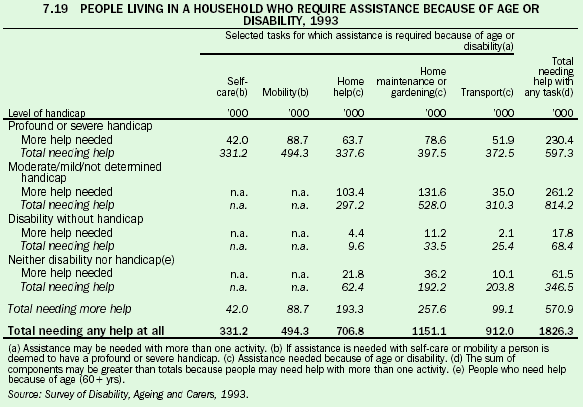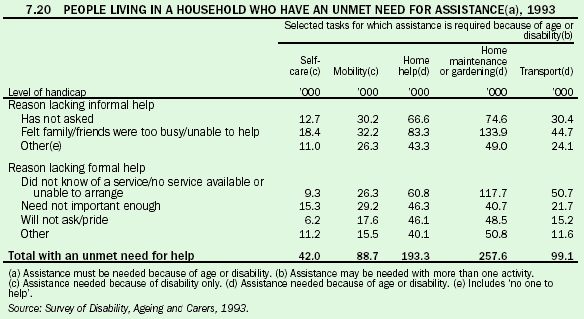PEOPLE WITH AN UNMET NEED FOR HELP BECAUSE OF AGE OR DISABILITY
It is important to identify the potential population who need support to remain in their own homes. The ABS Disability, Ageing and Carers Survey in 1993 showed that there were 1,826,300 people who required assistance with common daily activities because of age or disability (see table 7.19). In some cases the assistance received for these activities was enough to allow a person to live a relatively independent lifestyle in their own home, when they might otherwise have needed residential care. For others the receipt of help was less critical and would not directly affect their independence, but would have a positive impact on their daily life. A large proportion of those requiring help had a handicap (77%), while others needed help because of their age. Not everyone received as much help as they felt they needed.
People with a disability were considered to have a handicap if they had a limitation in performing certain tasks in one or more of the areas of self-care, mobility, verbal communication, schooling and employment. Four levels of severity of handicap were identified - profound, severe, moderate and mild. Those with profound or severe levels of handicap needed personal help with at least one activity in the areas of self-care, mobility or communication.
The majority of people who required help received some help, but not always as much as they would have liked. Of all those who required assistance because of age or disability, almost one-third (31%) reported a need for more assistance than they received with at least one activity. The likelihood of needing more help than was received, increased with the presence of a disability and the severity of handicap. For example more than one in three of those with a severe or profound handicap said they needed more help, compared with about one in six for those who needed assistance because of age only.
People in need of help (because of age or disability) required assistance with activities such as home help, home maintenance/gardening and meal preparation. Over one million people reported a need for help with home maintenance/gardening and about 22% felt they needed more help than they received with this. Of the 706,800 who required home help (i.e. assistance with washing, vacuuming, cleaning), around 27% would have liked more help.
Sometimes people who said they would like additional help did not seek this help. In other cases, help was sought but was not always available, either from informal sources such as family or friends or fromformal sources such as organisations. Around 52% of those who needed more help than they were receiving with home maintenance/gardening reported that they did not receive additional help because their family and friends were too busy or unable to provide more help (see table 7.20). A further 30% had not asked their family or friends, possibly because they preferred to remain independent.
The reasons for a lack of formal help differed depending on the activity in question. Some did not consider their need important enough for formal help while others were unable to arrange any. More than half of those who needed more help with self-care (showering, dressing, eating etc.) chose not to seek formal help because they would rather manage without help or because they did not consider their need important enough. Home maintenance was clearly an area where people would have liked to have arranged formal help for themselves, but were unable to for some reason. Of those who wanted more help in this area, 46% reported that the main reason they lacked formal help was because there was no service available (or they did not know of one), or they had been unable to arrange such a service.


 Print Page
Print Page